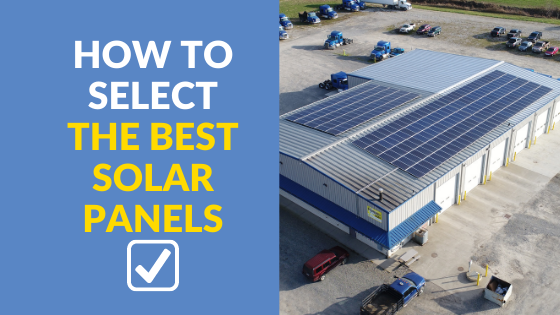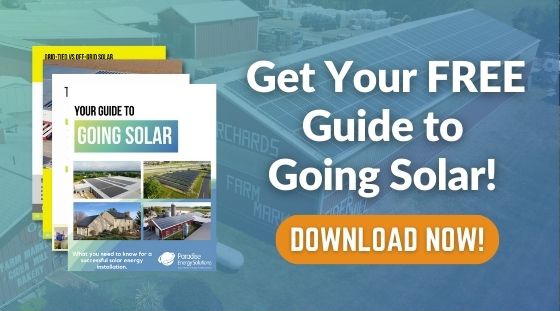A lot bit hinges on the type of solar panels you choose to install. High-quality panels from a reputable manufacturer can last decades and save you a great deal on electricity costs over the years. On the other hand, panels from manufacturers who prioritize initial cost over long-term performance can leave you with an underperforming system that won’t stand up to the test of time.
Choosing the right solar panels is an important step in creating a long-lasting, money-saving solar system. First, you’ll need to narrow down your aesthetic, budgetary, and energy production goals. Then, you can filter through all the options and end up with the perfect solar panels.
We want to help you make the choice that’s right for you and your goals. That’s why we’ve assembled a list of six things you should consider when selecting your solar panels.
What to look at when selecting the best solar panels for your project
1. Panel Type: Monocrystalline vs Polycrystalline
There are two main types of solar panels: monocrystalline and polycrystalline. Which one you choose will impact the overall look of your system, its cost, how much electricity it will produce, and how much space your system will cover.
Monocrystalline panels have an overall darker tint to the cells and are typically the more efficient option. Panels with a higher efficiency mean you can produce more electricity with fewer panels, so your overall system takes up less space. But for all their advantages, monocrystalline panels are often the more expensive option.
Polycrystalline panels have a bluer tint and are typically less efficient than monocrystalline, meaning you’d need a few more panels to generate the same amount of electricity. However, they do often come at a lower price, and despite the additional panels you’ll need, will likely be the cheaper option.
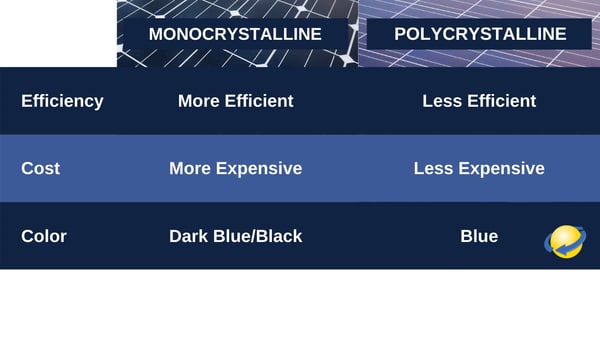 2. Panel Color: The Backsheet and Frame
2. Panel Color: The Backsheet and Frame
Another way you can control the look and price of your solar system is through the selection of backsheet and frame color.
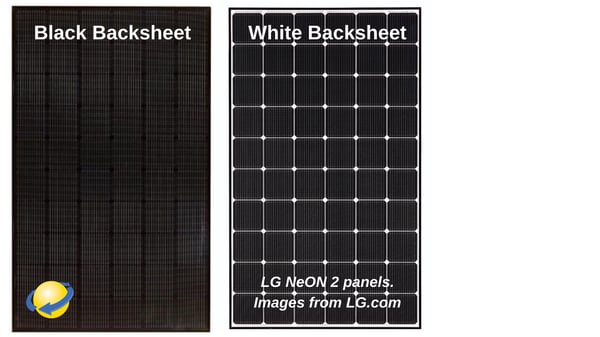
Each panel is composed of several silicon cells that are placed on a backsheet. This backsheet shows through the gaps between the cells and creates a grid-type design. Some manufacturers offer solar panels with black backsheets instead of the typical white.
Black backsheets create a more uniform-looking panel that blends into darker roofs. However, black holds heat, so black backsheets may get hotter than traditional panels, which could slightly reduce the panels’ efficiency.
There are also two options when it comes to the color of the metal frame around the borders of the panels: black and silver. Black frame panels can be more aesthetically appealing but will cost more. Aside from that, both black- and silver-frame panels should perform identically.
3. Solar Panel Size
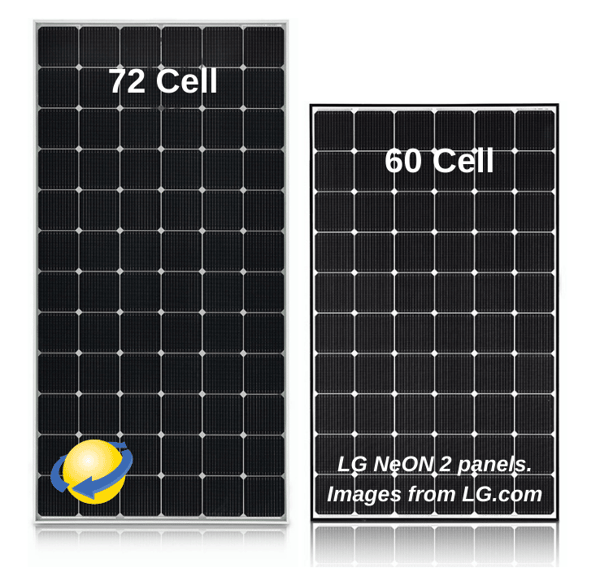
Solar panels come in two different sizes: 60-cell and 72-cell. This refers to the number of cells (the small, crystalline silicon wafer) on the solar panel. 72-cell panels are, on average, about a foot longer than 60-cell panels.
Their larger size makes 72-cell panels better suited for large, wide-open spaces like commercial roofs and ground mount systems. 60-cells are typically better suited to fit in tighter spaces, like on the dormer of a home’s roof. However, this isn’t a hard and fast rule and will vary from location to location.
Overall, 72-cells tend to be more economical, as they’ll generate more electricity per panel compared to an otherwise identical 60-cell panel.
4. Panel Production: Output Rating and Efficiency
Both the panel’s output rating and efficiency will impact how much power it can produce.
The output rating is the three-digit number you’ll see in the solar panel’s name, and it represents how many watts of electricity the panel will generate under ideal conditions.
Most panels have a wattage between 250 watts to 400 watts, with a few panels exceeding the 400-watt mark. A higher wattage means more electricity generated per panel, but it will likely mean a higher price tag. Though you’ll need fewer panels to reach your generation goals, it likely won’t offset the price increase.
However, wattage isn’t the only thing to look out for. You should also consider the panel’s efficiency. This is the percentage of electricity it produces from the energy it receives from the sun.
The more efficient a solar panel is, the more kilowatt-hours of electricity it will produce per watt of power capacity. This is especially important if you’re concerned about the amount of space your solar system takes up.
For example, let’s compare two 300-watt solar panels: one that’s 21% efficient, and another that’s 17% efficient. Both will produce 300 watts of power under ideal conditions. However, the one that has a higher efficiency will be physically smaller and take up less space than the one that is less efficient. So if you have high electric bills and a small amount of space to install your solar system, you’ll want to look for efficient panels.
5. Warranty
An important indication of overall panel quality is a robust warranty from the manufacturer. Many high-quality solar panels are guaranteed for 25 to 30 years and can continue working even after their warranty expires.
Making sure you purchase solar panels that will stand the test of time is essential to the long-term success of your system. The longer your solar panels generate electricity, the more money you save. And purchasing panels that are backed by a comprehensive warranty will help guarantee their success.
There are two kinds of warranties offered by most manufacturers: the performance and product warranty. The performance warranty assures that the panel will have the capability to produce a specified percentage of power during the warranty period, despite the panel's degradation. The production warranty protects your panels from material or workmanship issues.
6. Overall Quality
You want the highest quality solar panels at the best price. However, there are a few important factors to consider when evaluating the quality of a specific solar panel.
To get a true measure of a solar panel’s quality, you’ll want to look at things like their guarantee, the reputation of the manufacturer, customer reviews, and the panel’s technical specifications for things like efficiency, temperature coefficient, and power tolerance. Here’s a list of ten of the top solar panels on the market now.
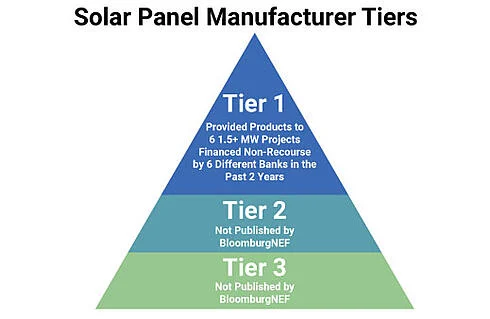
Another way to measure a solar panel brand, though imperfect, is by looking at what “tier” the solar panel manufacturer falls under. When researching different brands, you’ll likely come across lists that separate manufacturers into tier one, and even tier two and three, though there is no formal definition for tiers two and three.
Most assume tier one solar panel manufacturers tend to be the stronger brands. However, this isn’t necessarily the case. The tier system for solar panel manufacturers refers to how bankable a solar company is according to Bloomberg New Energy Finance Corporation (BNEF). While it’s fair to reason that a bankable company must have quality products, there are plenty of companies out there that do not meet the tier one specifications that offer great, high-quality panels.
What Are the Best Solar Panels?
There’s no one-size-fits-all answer to which solar panels are the best. That answer changes based on a variety of factors, like your budget, how much electricity you’d like to generate, the space you have to install the system, and what aesthetic concerns you have.
With the sheer amount of options available, this process can be overwhelming. Trying to determine the best combination of panel size, output rating, and efficiency is the most economical for your space, all while ensuring the panels are high quality and backed by extensive warranties takes experience. At Paradise Energy, we’ll maximize your budget and space with panels that suit your specific goals, be them budgetary, energy-related, aesthetically driven, or a combination of them all.


